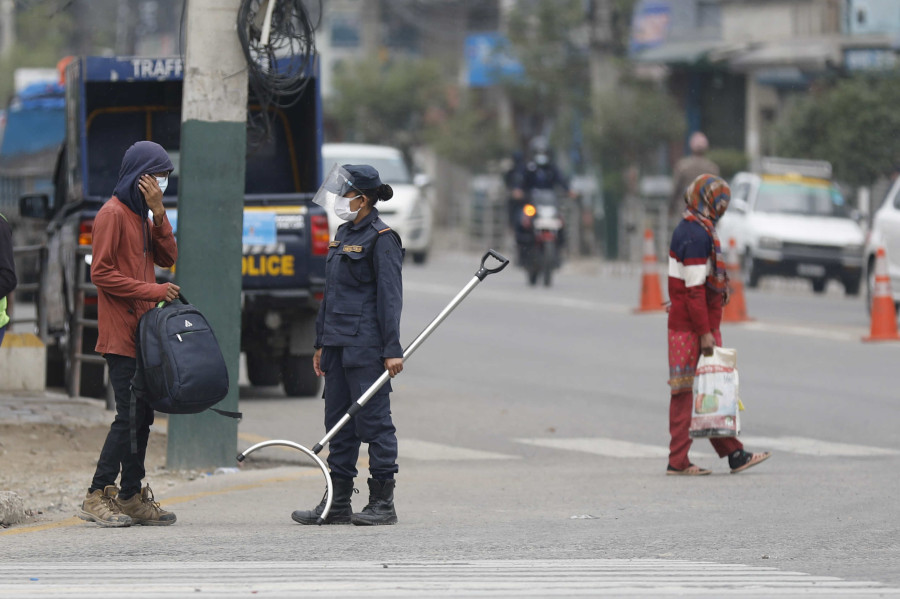Valley
Frontline security personnel lack safety gear, support from agencies
If one officer catches the virus, there is a risk of the infection spreading among many as they eat and live together.
Shuvam Dhungana & Anup Ojha
The three security agencies have been working tirelessly amid the pandemic—from enforcing prohibitory orders to maintaining law and order to managing the bodies of the Covid-19 victims—despite the risk of contracting infection.
But many of these security personnel who have been working on the frontline do not have proper safety gear.
A second wave of the coronavirus pandemic is sweeping across the country, and this time there are several mutated virus variants, considered more virulent and deadlier, fuelling the infection as well as fatalities.
The situation demands that the frontline workers are protected against the infection, but that has not happened, security personnel say.
“We have to interact with many people while doing our duty, but we don’t have proper safety gear. Even this mask I am wearing right now, I bought it myself,” a police officer deployed at Babarmahal told the Post.
The officer, who did not wish to be named, said he and his colleagues were looking after themselves, buying masks and hand sanitiser with their own money to keep themselves safe.
“We cannot wait for our department to provide us safety gear,” he added.
A female traffic officer deployed at Tripureshwor said she is wracked with fear every evening she reaches her room after her duty.
“I think to myself, what if I caught the virus today,” the 27-year-old officer said.
Despite the prohibitory orders in place, we are still dealing with dozens of motorists daily.
“In order to check their IDs and government-issued passes we have to interact with them. Without proper safety gear, there is a high chance of me and my colleague getting infected,” added the female officer, who wished to remain anonymous.
According to the Metropolitan Traffic Police Division, 36 of its officers are currently down with Covid-19. Last year, 431 traffic police personnel were infected with the virus.
SSP Janak Bhattarai, chief of the division, said they lack personal protective equipment (PPEs) to keep the officers safe.
“We have deployed 1,500 traffic officers on 72 checkpoints and for each checkpoint we only have two PPE sets. The officers are wearing them taking turns,” said Bhattarai.
The country reported a record 9,023 new infections in the last 24 hours, according to a government tally released on Friday afternoon. The government also confirmed 50 Covid-19 deaths in the same period.
As of Friday, the country’s overall infections have reached 377,603, of which 78,629 are active cases. The overall death toll stands at 3,579.
The Kathmandu Valley recorded 4,106 new infections in the past 24 hours, of which 3,089 were confirmed in Kathmandu, 643 in Lalitpur and 374 in Bhaktapur.
“New infections and deaths are mounting, and it’s frustrating when we come across the people breaching the lockdown rules,” said the officer stationed at Babarmahal. “We are here working for the safety of the public, so that the virus can be contained. But some people are simply not bothered.”
Brigadier General Shantosh Ballave Poudyal, spokesperson of Nepal Army, understands the risk frontline workers are going through.
“Already, we’ve lost three soldiers to Covid-19. We also have 164 cases of active infections in our ranks,” said Poudyal.
The Nepal Army is involved in the management of bodies of Covid-19 victims.
“We have safety protocols in place for our frontline workers. We have also set up isolation centres and vaccinated over 47,000 personnel,” added Poudyal.
But despite the Covid-19 protocols in place, the Nepal Army frontline workers remain at risk of contracting the coronavirus. The same goes for the Armed Police Force, which has 124 cases of infections at the moment.
“Our officers are also mobilised along the Nepal-India border. So they are at risk,” said Deputy Inspector General Raju Aryal, also the spokesperson for the Armed Police Force.
The coronavirus infected many Nepal Police personnel, but the agency refused to disclose the extent of the virus spread, citing that it could affect the morale of its officers.
But according to a Kantipur article, over 150 police personnel are either in isolation or in hospital getting treatment after being infected with the coronavirus.
Senior Superintendent Basanta Bahadur Kunwar, spokesperson for the Nepal Police, said they cannot disclose the official data of Covid-19 infection in the agency.
“Though the number of infected personnel is controllable now, we are afraid that it could go up. So we have instructed our officers to follow all safety protocols,” he said. “We cannot do our regular job without being exposed to the members of the public. We are trying our best to take precautions.”
Sub-Inspector Jahendra Bahadur Basnet said if one officer catches the virus, a lot of them could get infected because they live and eat together.
The frontline workers do not undergo regular tests, so the only way of knowing if they have been infected is only if they get sick.
“If there are any of the Covid-19 symptoms, we send the concerned officer to Nepal Police Hospital for check-up and treatment,” Basnet said.
But since the Nepal Police Hospital is also treating civilians who are down with Covid-19, finding a hospital bed is not easy these days.
“We are looking for an alternative to deal with the crisis,” SSP Kunwar said.




 22.9°C Kathmandu
22.9°C Kathmandu
.jpg)













